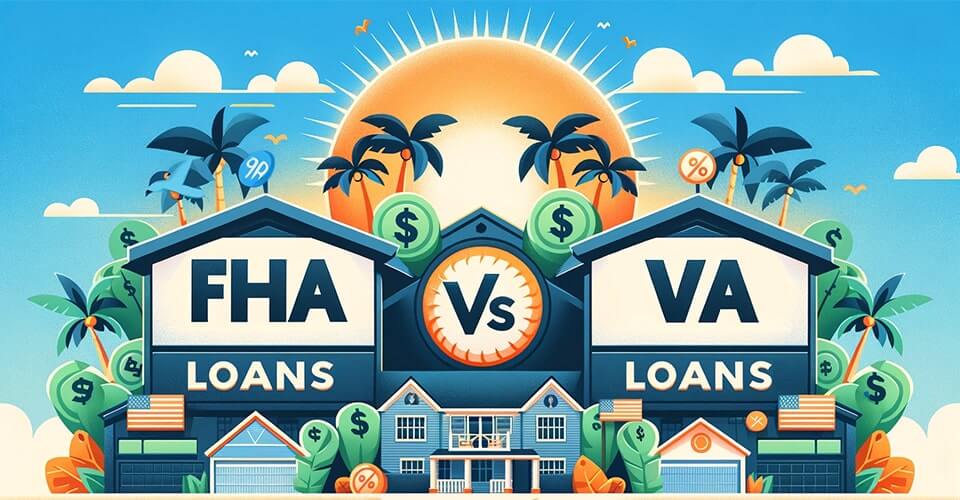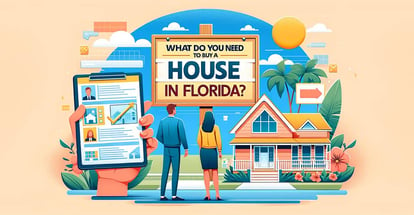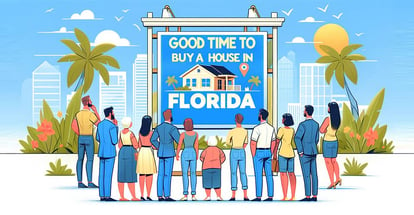FHA Vs. VA Loans - Florida Benefits and Eligibility
VA loans are renowned for their generous terms, including no down payment or mortgage insurance requirements. These features make them an exceptionally attractive option for those who have served in the military. However, the allure of VA loans doesn't automatically render FHA loans less appealing.
On the other hand, FHA loans cater to a different demographic, particularly appealing to those with lower credit scores. They offer a pathway to homeownership for individuals who might otherwise struggle to secure financing.
Despite requiring a down payment and mortgage insurance, FHA loans are known for their more lenient lending standards and government backing, which reduces the risk for lenders.
In this blog, we'll delve into the nuances of both FHA and VA loans in the Florida housing market. We'll compare their requirements, benefits, and potential drawbacks, helping you decide which loan type best suits your financial situation and homeownership goals.
An Overview - VA Loan vs. FHA Loan in Florida
In Florida, homebuyers often choose between VA and FHA loans, each with distinct features tailored to different needs.
VA loans, primarily available to U.S. veterans, active-duty service members, and some military spouses, stand out for their potential to offer zero down payment in most instances.
Unlike FHA loans, which are more broadly accessible to first-time buyers and those with lower credit scores, VA loans do not have set minimum credit score requirements, although lenders commonly look for scores around 620.
On the other hand, the FHA loan requires a down payment of at least 3.5% and accommodates lower credit scores, with a range of 500 to 579 needing a minimum 10% down payment and scores 580 or higher qualifying for the standard 3.5% down payment.
Both types of loans are restricted to primary residences and have specific loan limits based on the county – FHA loan limits vary from $472,030 in less expensive areas to $1,089,300 in pricier locales. In contrast, most VA loans do not have federal loan limits.
Another key difference lies in the additional costs. VA loans come with a one-time funding fee ranging from 1.25% to 3.3% of the loan amount, depending on various factors, including the borrower's military status and whether it's their first VA loan.
FHA loans, in contrast, impose both an upfront premium (1.75% of the loan amount) and an annual premium (ranging from 0.15% to 0.75%), adding to the overall cost of the mortgage.
Debt-to-income ratios (DTI) and mortgage rates diverge between these two loans. VA loans typically allow a DTI of up to 41%, with increased scrutiny for higher ratios, whereas FHA loans may go up to 50% DTI, contingent on credit scores and other factors.
As for mortgage rates, VA loans often come with lower rates than FHA loans, making them a potentially more cost-effective option over the long term for those who qualify.
For Florida homebuyers, the decision between a VA and FHA loan hinges on factors like military service, credit score, down payment capacity, and overall financial situation. Each loan offers unique advantages and caters to different segments of the homebuyer market.

VA Loan vs. FHA Loan - Average Mortgage Rates
Mortgage rates are a critical factor for homebuyers in Florida, as they directly influence the long-term cost of a mortgage.
When comparing VA loans and FHA loans, there are noticeable differences in average mortgage rates, which can impact the overall affordability of the loan.
VA Loans: Generally Lower Interest Rates
VA loans are known for their slightly lower mortgage interest rates. This is partly due to the Department of Veterans Affairs' backing, which provides lenders an additional layer of security.
As a recent example, in the 30 days ending August 30, 2023, the average 30-year fixed rate for VA loans was reported at 6.71%, according to Optimal Blue's Mortgage Market Indices.
This rate is typically more favorable than what's available for most conventional loans, making VA loans an attractive option for eligible borrowers.
FHA Loans: Slightly Higher Rates Compared to VA Loans
On the other hand, while offering more inclusive credit requirements, FHA loans generally come with slightly higher mortgage rates.
In the same period, FHA loans had an average 30-year fixed rate of 6.95%. This higher rate reflects the increased lending risk to borrowers with lower credit scores or higher debt-to-income ratios.
VA Loan vs. FHA Loan - Credit Score Requirements
Credit score requirements are a pivotal aspect of the mortgage process and vary significantly between VA and FHA loans. These requirements are crucial for Florida homebuyers, impacting eligibility and loan terms.
VA Loans: Lender-Set Credit Scores
While the VA itself does not set a minimum credit score for home loans, lenders who offer these loans typically do. Most lenders look for a minimum credit score in the mid-600s, though this can vary.
The absence of a VA-mandated minimum score gives lenders the flexibility to assess borrowers based on their overall credit profile. However, it also means that eligibility criteria can differ from one lender to another.
FHA Loans: More Inclusive Credit Requirements
FHA loans are known for their more inclusive credit score requirements. The lowest score to qualify for an FHA loan is 500 – significantly lower than most VA lenders' thresholds.
However, this lower limit comes with a catch: borrowers with credit scores between 500 and 579 must make a larger down payment of 10%. For those with a credit score of 580 or higher, the down payment requirement drops to the more manageable 3.5%.
The key takeaway for homebuyers in Florida is that FHA loans might offer a viable alternative for those whose credit scores do not meet the typical requirements set by VA lenders.
FHA loans allow individuals with lower credit scores to still pursue homeownership, albeit often with a higher down payment requirement for those at the lower end of the credit spectrum.
VA Loan vs. FHA Loan - Property Type Requirements
Both VA loans and FHA loans are specifically designed for the purchase or refinance of a primary residence. This focus ensures that the loans serve those looking for a home rather than for investment purposes or as a secondary residence.
For a property to qualify under either a VA or FHA loan, it must adhere to certain safety and structural integrity standards. These standards are in place to protect the borrower from investing in a property that could lead to financial hardship due to unforeseen repairs or safety issues.
In summary, for homebuyers who are veterans or meet the FHA criteria and are looking to buy or refinance a primary residence in Florida, VA and FHA loans present attractive options. They offer unique benefits like lower down payments and more lenient credit requirements.
However, turning towards conventional mortgages would be the way to go for those eyeing a vacation getaway or an investment venture.
VA Loan vs. FHA Loan - Minimum Down Payment
Minimum down payment is a crucial factor for homebuyers in Florida, particularly when comparing VA loans and FHA loans.
VA loans are highly beneficial for those who qualify due to their usually nonexistent down payment requirement.
VA loans offer eligible veterans, active-duty service members, and certain military spouses the remarkable advantage of potentially acquiring a home with zero down payment.
On the other hand, FHA loans, which are accessible to a broader range of buyers, including those with lower credit scores, do require a down payment. The minimum down payment for an FHA loan is 3.5% for borrowers with a credit score of 580 or higher.
This is relatively low compared to conventional loan requirements, making FHA loans a viable option for those who cannot afford a large down payment.
However, for those with credit scores ranging from 500 to 579, the FHA mandates a higher down payment of 10%. This higher requirement reflects the increased risk associated with lower credit scores.
The key takeaway here is that VA loans stand out as the clear winner when it comes to the lowest down payment requirement. This advantage can be particularly significant for first-time homebuyers or those without substantial savings.
FHA loans, while more inclusive in terms of credit score requirements, still necessitate a minimum down payment, placing them a step behind VA loans in this regard.
VA Loan vs. FHA Loan - Loan Limits
Understanding the loan limits for VA and FHA loans is a key consideration for Florida homebuyers, as these limits can significantly influence the amount one can borrow.
VA and FHA loans approach these limits differently, reflecting their distinct objectives and target audiences.
VA Loans: Flexible Limits with Specific Conditions
VA loans offer a unique advantage in terms of loan limits. There are no federal loan limits for those who have never had a VA loan or have fully repaid a previous VA loan.
This lack of a cap means eligible borrowers can potentially secure financing for more expensive properties without being constrained by preset limits.
However, it's important to remember that the actual amount a borrower can secure is still subject to lender approval based on their credit, income, debts, and assets.
FHA Loans: County-Specific Limits
In contrast, FHA loans have preset limits that vary by county and can be adjusted annually. These limits range from $472,030 in low-cost counties to $1,089,300 in high-cost areas.
These limits reflect the varying real estate prices across different regions, ensuring that the loan amounts are aligned with local market conditions.
The distinction in loan limits between VA and FHA loans is significant.
VA loans typically do not impose federal limits for many borrowers, offering greater flexibility, especially for those purchasing in higher-priced markets. This flexibility can be a decisive factor for eligible veterans or service members.
On the other hand, with their county-specific limits, FHA loans offer a more standardized approach, catering to a wider range of borrowers but with defined borrowing ceilings.
VA Loan vs. FHA Loan - Mortgage Insurance and Fees
Mortgage insurance and associated fees are critical for Florida homebuyers exploring VA and FHA loans. These costs can significantly impact a mortgage's overall affordability and long-term expenses.
VA Loans: One-Time Funding Fee
A distinct advantage of VA loans is that they do not require ongoing mortgage insurance, a typical expense with many other loan types.
Instead, VA loans include a one-time VA funding fee. As of December 2023, this fee ranges from 1.25% to 3.3% of the loan amount for purchase mortgages.
The exact percentage depends on several factors: the down payment size, whether the borrower has previously used a VA-backed loan and other criteria set by the Department of Veterans Affairs.
This funding fee offsets taxpayers' costs since VA loans often do not require mortgage insurance or a down payment. Borrowers can pay this fee upfront or roll it into the total loan amount, providing flexibility in managing this cost.
FHA Loans: Upfront and Annual Mortgage Insurance
In contrast, FHA loans require mortgage insurance to protect lenders in case of default. This insurance comes in two parts: an upfront and an annual premium.
The upfront premium is 1.75% of the loan amount, which, like the VA funding fee, can be rolled into the mortgage. The annual premium, split into monthly installments added to the mortgage payment, ranges from 0.15% to 0.75% of the loan amount.
This rate varies depending on the specifics of the loan, including the amount and down payment and the term length. Most borrowers under the FHA program pay an annual rate of around 0.55%.
Comparing Costs: VA versus FHA Loans
The VA loan one-time funding fee might be more economical over the long term than the FHA's ongoing mortgage insurance premiums.
VA loans are typically more favorable for those who qualify, with the one-time fee being a relatively minor expense compared to the recurring cost of FHA mortgage insurance.
However, for those who don't qualify for VA loans or prefer FHA loans' more inclusive credit requirements, the added cost of mortgage insurance is a necessary trade-off for the benefits these loans provide.
VA Loan vs. FHA Loan - Maximum Debt-to-Income Ratios
For Florida homebuyers, understanding the role of debt-to-income (DTI) ratios in securing a mortgage is essential.
This ratio, which compares your gross monthly income to your monthly debt obligations, is crucial in determining your eligibility for both VA and FHA loans.
VA Loans: Flexible DTI with Additional Scrutiny Over 41%
The VA does not strictly enforce a maximum DTI ratio for its loans. This flexibility can be particularly advantageous for borrowers with higher incomes with proportionately higher debts.
However, there is a caveat: applicants with a DTI ratio exceeding 41% are subject to more thorough reviews. This additional scrutiny ensures that borrowers have sufficient funds remaining for living expenses after covering their mortgage and other debts.
The VA's approach here is focused on ensuring that taking on a mortgage is sustainable for the borrower in the long term.
FHA Loans: Generally Capped at 50% DTI
FHA loans, in comparison, typically have a maximum DTI ratio of around 50%. This cap is slightly higher than what is usually seen with conventional loans, making FHA loans accessible to a broader range of borrowers.
However, this threshold might be adjusted downwards based on factors like credit score. The FHA’s policy balances making loans accessible to those with higher debt levels and maintaining responsible lending practices.
Bottom Line - Choosing Between VA and FHA Loans in Florida
In Florida's diverse housing market, homebuyers frequently face the decision between Federal Housing Administration (FHA) loans and Veterans Affairs (VA) loans.
Each type presents distinct advantages and caters to different segments of the homebuyer population; choosing between them is pivotal for prospective homeowners.
VA loans are highly regarded for their generous terms, especially for those who have served in the military. One of the most notable advantages is the potential for no down payment and the absence of ongoing mortgage insurance requirements.
These features significantly reduce a mortgage's upfront and long-term costs, making VA loans an exceptionally attractive option for eligible individuals.
FHA loans, conversely, are designed to be more inclusive, particularly benefiting those with lower credit scores. They provide a path to homeownership for individuals who might face challenges securing financing through other means.
While FHA loans require a down payment and ongoing mortgage insurance, their more lenient lending standards and government backing make them a valuable option for many Florida borrowers.
With over 50 years of mortgage industry experience, we are here to help you achieve the American dream of owning a home. We strive to provide the best education before, during, and after you buy a home. Our advice is based on experience with Phil Ganz and Team closing over One billion dollars and helping countless families.

About Author - Phil Ganz
Phil Ganz has over 20+ years of experience in the residential financing space. With over a billion dollars of funded loans, Phil helps homebuyers configure the perfect mortgage plan. Whether it's your first home, a complex multiple-property purchase, or anything in between, Phil has the experience to help you achieve your goals.


 By
By  Edited by
Edited by 






